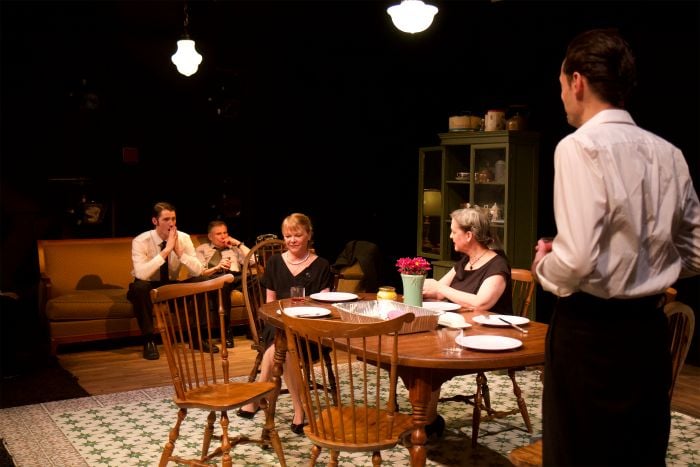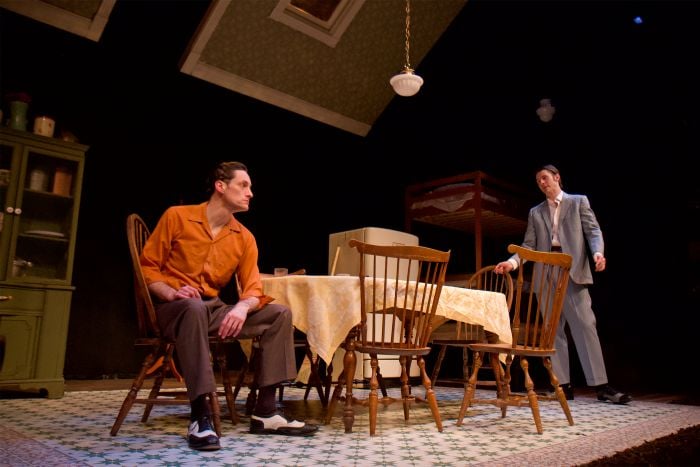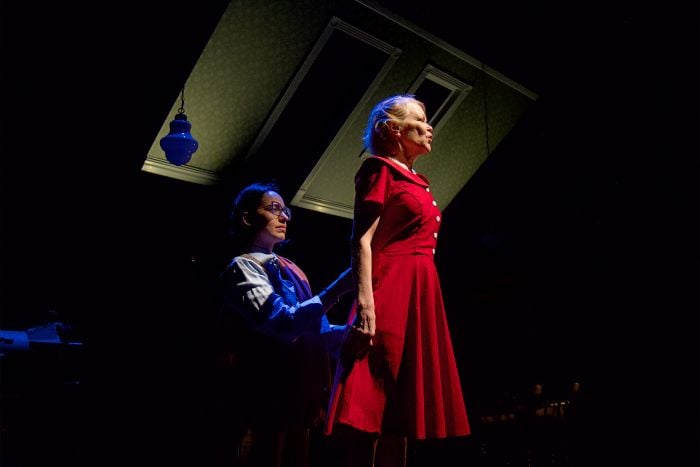In her unauthorized sequel to Arthur Miller’s 1949 tragedy Death of a Salesman, playwright Barbara Cassidy considers what might have happened to Willy Loman’s wife Linda after his suicide, in Mrs. Loman, a feminist critique of rampant misogyny, racism, and the failure of the American Dream, both then and now, playing a limited engagement at NYC’s Theatre Row, following its world premiere at The Tank in 2022. Referencing figures and plotlines from Miller’s mid-century classic, Cassidy here makes the titular widow the central focus of the follow-up story, giving her a more fully rounded three-dimensional personality, exploring her options, and imagining this next phase of her life. Where will it lead her?

The show opens at the Lomans’ home in Brooklyn immediately following Willy’s poorly attended funeral, where Linda (portrayed by Monique Vukovic) is serving a modest repast to their sons Biff (played by Matt “Ugly” McGlade) and Happy (Hartley Parker), her late husband’s only true friend Charley (Jerry Ferris), and his son Bernard (Joe Gregori), as they discuss the reason for the small turnout and Willy’s chosen method of suicide, and, after the arrival of their neighbor Esther (Linda Jones), toast to his life. Though critical of their father, Linda proclaims that he is deserving of dignity and respect, not criticism – and that’s just the first time she makes her feelings known, in a play that gives her the voice she didn’t have in Miller’s original.
We watch her freedom of expression and self-confidence grow over the following weeks, as she enrolls in a college course, listens to music, smokes a reefer, dances, laughs, and develops a bond with Esther, speaks openly and honestly about race relations and acceptance with Biff’s Black girlfriend Lena (Ara Celia Butler), whom he never introduced to anyone for fear of their reaction, discusses their financial situation with her sons, and ultimately confronts them about the stories she overheard and was informed about of Happy’s sexual abuse of women (Max Mooney serves as intimacy coordinator), no longer choosing to remain silent or unquestioningly supportive of the men in her family. It’s a momentous issue that builds to a crescendo, brings the brothers to blows (fight choreography by Sean Griffin), dramatically impacts Linda’s future, and resonates with the never-ending woman-blaming that persists into our own time.

In addition to the chronological narrative and character developments, Cassidy inserts the metatheatrical figure of a Contemporary Woman (Patricia Marjorie), who stands up in the front row of the audience, comes onto the stage, analyzes and endorses Linda’s actions and options, citing such renowned female philosophers as existentialist and feminist activist Simone de Beauvoir, helps with her costume changes, and creates a tie-in to our own times (which for me is an unnecessary device, since the character arc of Mrs. Loman is clearly presented, as is the rampant misogyny and discrimination in her story).

Under the keen and well-tempered direction of Meghan Finn, each member of the superb cast captures the personalities, emotions, and interactions of the characters and the dense plot points, bringing insight and credibility to Cassidy’s vision. The artistic design likewise transports us into her world, with a period-style set by Christopher and Justin Swader, vintage costumes and props by Patricia Marjorie, evocative lighting by Brian Aldous and sound, with Olivia Cole-Berry acting as associate sound designer and supervisor.
In keeping with the tone of Death of a Salesman, Cassidy’s play also comes to a tragic end. And implicit in the story is the underlying message that our present time is turning back the clock on any advances we’ve made since the mid-century in human rights, equality for all, and the American Dream, noting it’s not just about Mrs. Loman, it’s about America. It’s a chockful work with a resonant theme delivered by a compelling cast.
Running Time: Approximately 90 minutes, without intermission.

Mrs. Loman plays through Sunday, February 15, 2025, at Theatre Row, 410 West 42nd Street, NYC. For tickets (priced at $52.50, including fees), go online.

